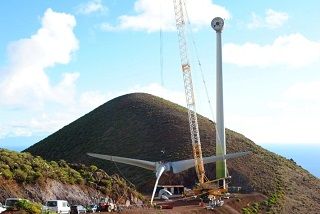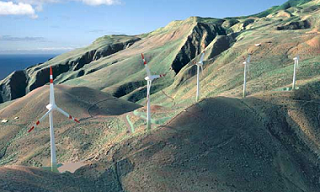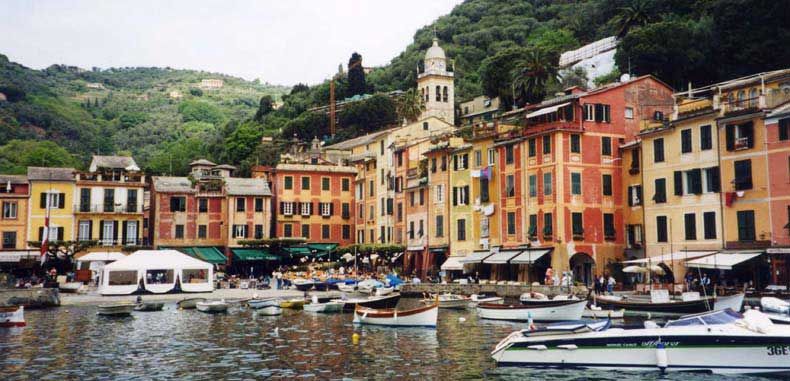Not Another Drop of Diesel for Gorgeous El Hierro

But, wait a second….how about this? These people have sworn off the 6600 tons of diesel they used to import annually, and have begun generating their electricity with 100% renewable energy. That’s right; it’s all wind energy with pumped storage hydro. They have good wind resources, but, when the wind slows down, it takes the grid operators less than five seconds to make it up with hydro power, and, according to something I heard this afternoon, “the lights don’t even flicker.”
There’s no pretending that their new five 64-meter wind turbines were easy to get out there and install; the picture above was taken during the actual process. 
The same spokesperson laments the fact that many of the people who grow up on the island eventually go off to find greener pastures, but he told his interviewer, “100% clean energy. Not another drop of fossil fuel. This just might bring some of them back.” I certainly hope he’s right.
In any case, El Hierro, thanks for showing us the way. Looks incredible, btw.


Any information on the payback time for them? Steep hilled islands that can do pumped hydro are certainly an attractive niche market for renewable. That is the lowest cost storage possible (except when there is already a hydro plant nearby), and it must cost a lot to bring diesel to an island.
No one who is an accountant or who understands how to evaluate investments would emphasize payback time. The proper way to evaluate investments is return on investment, best determined by calculating the internal rate of return.
http://en.wikipedia.org/wiki/Internal_rate_of_return
Perhaps the Canary Islands have made the best possible choice for them, although that is not entirely clear. I don’t know the frequency of hurricanes there and wind generators generally don’t stand up well to hurricane force winds, but perhaps hurricanes are rare there.
It is geography that makes wind power practical there. The geography makes hydro power and pumped storage practical at a reasonable price, especially when the alternative is very expensive Diesel fuel and Diesel generators which have high maintenance costs. Most places are less fortunate.
Hey Craig, who can I contact there to show them my Hybrid Home Plan?
Hi, Don. Please see my email.
What a wonderful set up! I’m concerened though that they may have to move upstairs as sea levels rise.
Ron,
Your concern about rising sea levels is valid. Already rising sea levels are causing problems for people living on coral islands which are not much above sea level. On some low-lying islands, people are already making plans to move elsewhere; they will be climate refugees. However, the subject islands evidently have areas which are much above sea level else it would not be possible for them to have hydro power and pumped storage. To what extent the people living there will be affected by rising sea levels I don’t know.
Example of Canary Islands in resorting to wind energy replacing dirty energy using diesel is praiseworthy and emulating as well wherever possible. Combining pumped storage as answer to fluctuating energy output by wind only is unique. Not all sites have facilities for this combination. Thanks Craig for bringing the venture to light for info of many around the world.
Refurbindia, bangalore, india
Craig, watch your sources. You will have to change the title of the article.
They´re selling it as a 100% renewable supply but it´s not. In fact it will be a 65% in a yearly basis, which is quite good anyways. I understand the 100% refers to instant supply; people must know this. We will see how it performs.
I am a renewable energy professional and I´d love that a 100% free-fuel would be possible but we must be accurate when talking about these issues. There is a long way to go yet.
http://www.hydroworld.com/articles/print/volume-20/issue-5/articles/pumped-storage/creating-a-hybrid-hydro-wind-system-on.html
From the economic standpoint, 65% renewable is probably quite good considering the cost of Diesel power which is their only alternative. Whether it would be economical to increase renewables to 100% I don’t know, but perhaps they can considering their geography. On a global basis, CO2 emissions will not be significantly affected by what a few small island countries do so from that standpoint, probably economics should be the sole consideration.
Eventually, the world will have to get about 90% of its power from non-CO2 emitting sources. That will be challenging since as large poor countries seek to lift their people out of poverty, world power usage will probably have to increase by about FOUR TIMES!! That includes power for heating, cooling, lighting, cooking, transportation, manufacturing, and anything I’ve missed. I really don’t see how that can be done without nuclear power, but we do need a better nuclear technology to eliminate the problems associated with it. That will require spending huge amounts on R & D.
There is considerable energy in ocean waves, but so far no practical method has been found to harness it. It may be that it will never be practical, but it is possible that a way could be found.
Of course they have a very mild climate so don’t use a lot of electricity for heating and as Frank points out, have other geographical/geological advantages. Actually wave-power might be an even better opportunity than wind, for islands, with stored hydro producing all the power. I hope Gran Canaria does something like this as well as it has similar topography but a larger population.